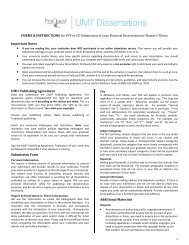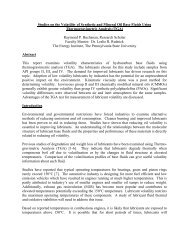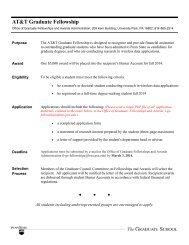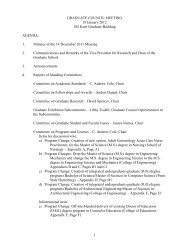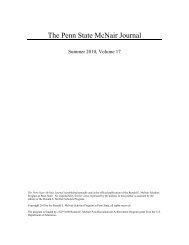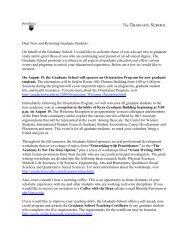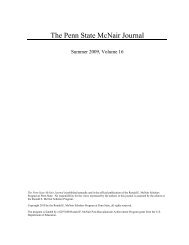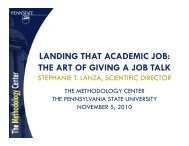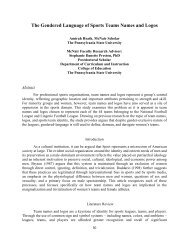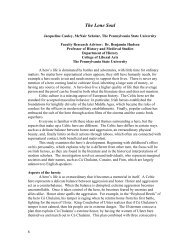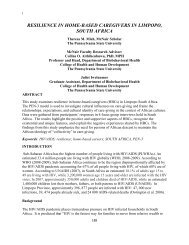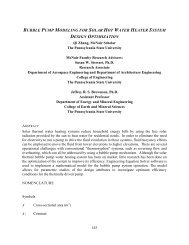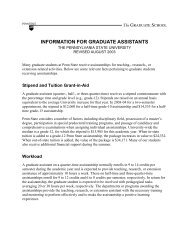1 GRADUATE COUNCIL MEETING 9 May 2012 102 Kern Graduate ...
1 GRADUATE COUNCIL MEETING 9 May 2012 102 Kern Graduate ...
1 GRADUATE COUNCIL MEETING 9 May 2012 102 Kern Graduate ...
Create successful ePaper yourself
Turn your PDF publications into a flip-book with our unique Google optimized e-Paper software.
H13<br />
*AFR/PL SC 534- Political Economy of Petroleum, Energy and Extractive Industries in Africa<br />
(3)<br />
This course examines the extractive industry-driven changes in Africa’s political economy as<br />
well as in the continent’s foreign relations. Students are encouraged to examine the institutional<br />
mechanisms under which the expansion of the industry is taking place in Africa. The course,<br />
thus, involves an extensive discussion of the institutional characteristics of Africa, including<br />
issues of land tenure and property rights laws. It examines how the institutional mechanisms are<br />
changing in order to facilitate the industry’s expansion and the repercussions of these<br />
institutional changes on society. The course also analyzes the industry’s impacts on Africa’s<br />
socioeconomic development and global relations.<br />
*AFR 536- Kinship and Social Practices in Africa (3)<br />
The course analyses different kinship theories and how they may enable us to enhance our<br />
understanding of the different dimensions of African social practices in historical and<br />
contemporary Africa. It examines theories of kinship and social formations in order to interpret<br />
the relevance of traditional formations in historical and contemporary African development. It<br />
also examines the implications of social formations for political change (example,<br />
democratization), social (example, corruption and institutional failures) and cultural (ethnicity<br />
and religion) for shaping change in contemporary Africa.<br />
*AFR/WS 537-Gender, Sexuality and Islam in Africa (3)<br />
This course focuses on the intersection of Feminist Studies, African Studies and Religious<br />
Studies. It offers students an advanced level of reading, analysis and discussion about discourses<br />
of sexuality and gender in studies of Islam in Africa. It discusses key African and feminist<br />
theoretical concepts in the study of gender and Islam and also engages discussions of religion,<br />
gender and sexuality. Building on these foundations, the course examines the historical, literary<br />
and visual representation of gender, sexuality and Islam in South Africa as case study. The latter<br />
section includes discussions of recent theoretical debates about sexual diversity in Islam as well<br />
as the impact of activism, political representation and artistic, literary and autobiographical<br />
representations by gay and lesbian Muslims in South Africa.<br />
The core electives listed above provides students with the opportunity to pursue in greater detail,<br />
one of the three key themes covered in AFR 501: history and culture (536 or 537); political<br />
economy (527, 530, 534,); and human-environment interactions (527, 532, 534).<br />
Additional Elective Courses Available at University Park<br />
AFR/PL SC/IB 440 (US;IL) Globalization and Its Implications (3)<br />
AFR/PL SC 443 (IL) Ethnic Conflict in Africa (3)<br />
AFR/PL SC 454 (IL) Government and Politics of Africa (3)<br />
AFR/PL SC 434 (IL) War and Development in Africa (3)<br />
AFR/PL SC 464 (IL) Globalization, Extractive Industries, and Conflict in Africa (3)<br />
AFR 496 Individual Studies (3)<br />
AFR 499 Foreign Studies (3)<br />
10



